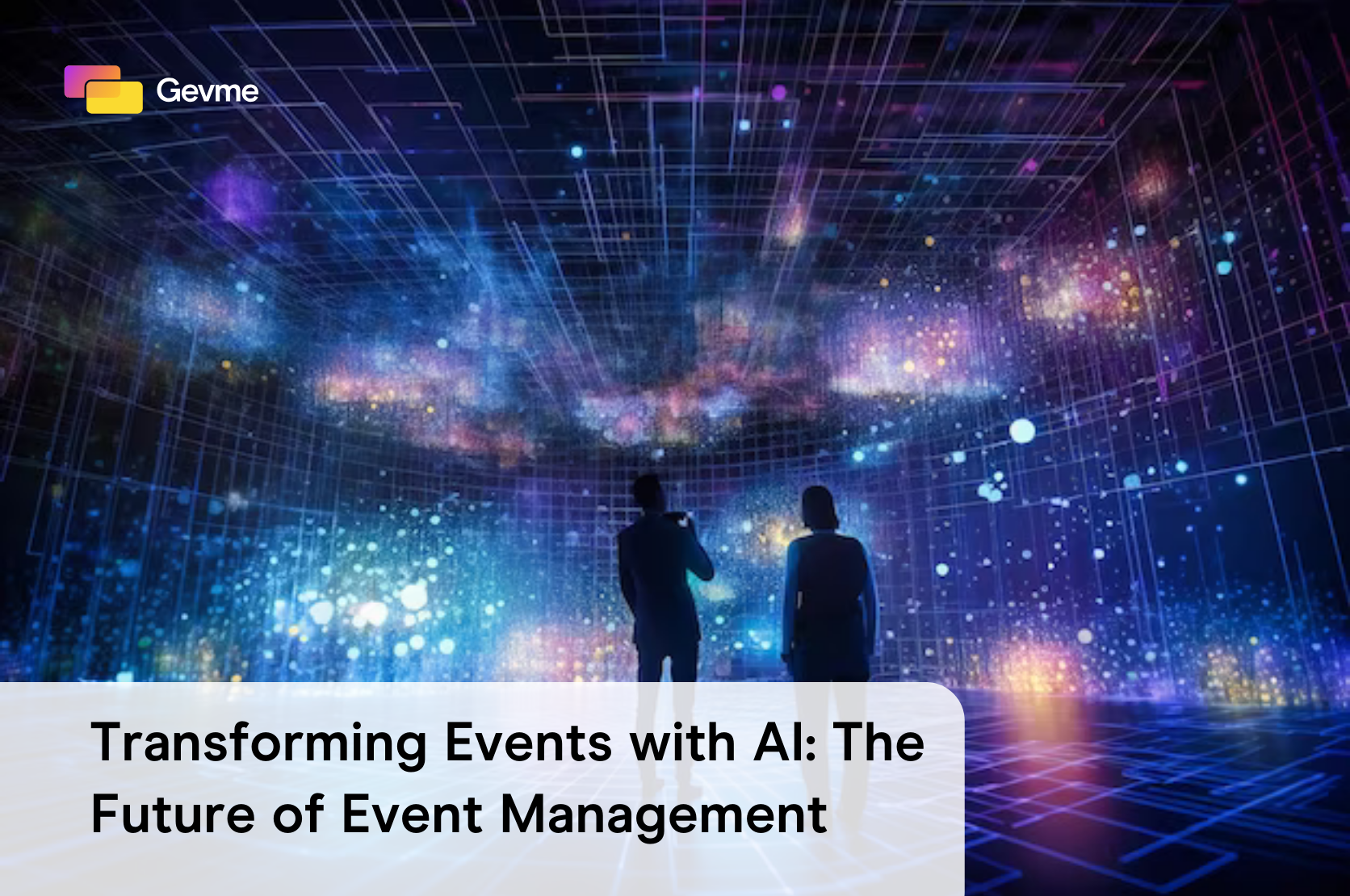As we navigate through the rapidly advancing technological era, the influence of Artificial Intelligence (AI) in event management is becoming increasingly pivotal. AI in event management is shaping the way events are planned, executed, and experienced.
In this blog, we will delve into the diverse applications and future possibilities of AI in events, examining its transformative role in enhancing event planning, personalisation, and attendee engagement. The integration of AI in event technology is not just an enhancement but a significant evolution, marking a new era in how we approach and understand event management.

The Current State of AI in Event Technology
AI’s integration in event management is already making significant strides. Here’s a more detailed look at its current applications:
- Automated Customer Service: AI-powered chatbots and virtual assistants are revolutionizing customer service in event management. These tools provide instant responses to attendee queries, handle registrations, and offer personalized event information. Their ability to manage thousands of interactions simultaneously improves overall efficiency and attendee satisfaction.

- Facial Recognition for Enhanced Security: AI’s application in facial recognition technology is a leap forward for event security. The integration of AI in events speeds up the check-in process, reduces the risk of unauthorised access, and enhances overall attendee safety, all while providing a more personalised welcome experience.
- AI-Driven Networking Tools: By analyzing attendee profiles and preferences, AI algorithms facilitate meaningful networking opportunities. AI in event management can recommend sessions, connect attendees with similar interests, and create networking groups, enhancing the event’s value for participants.
- Predictive Analytics for Event Planning: Utilising AI for predictive analytics helps event organisers forecast trends, attendee behaviours, and preferences. This insight is invaluable for planning relevant content, optimising event schedules, and ensuring resources are allocated effectively.
- Personalised Event Experiences: AI in event management is leading the charge in personalising attendee experiences. From suggesting sessions based on interests to customizing event notifications, the use of AI in events ensures that each attendee’s experience is tailored to their preferences, making events more engaging and interactive.
- Operational Efficiency and Logistics: The role of AI in event management significantly enhances operational aspects, bringing efficiency to events. It streamlines processes like scheduling, venue selection, and resource distribution, thereby ensuring smoother event execution and better resource utilization.
Personalisation and Attendee Experience
The role of AI in events has become a cornerstone in elevating personalisation and enriching the attendee experience:
- Tailored Content Delivery: AI’s ability to analyse extensive attendee data translates into highly tailored content delivery. AI in event management discerns individual preferences, allowing for personalised schedules and targeted communications in events, ensuring each attendee’s experience is uniquely aligned with their interests.
- Enhanced Engagement Through Interactive Platforms: AI-driven platforms are revolutionising attendee engagement. These platforms offer interactive features like augmented reality experiences, virtual assistants for queries, and personalised agenda building, which not only captivate attendees but also make the event more accessible and enjoyable.
- Improved Networking Opportunities: AI enhances networking by smartly connecting attendees based on their professional interests, past event interactions, and specific preferences. This leads to more meaningful connections, fostering a sense of community and collaboration among participants.
- Dynamic Event Environments: AI enables the creation of adaptive event environments. By analysing real-time attendee data, environments can change dynamically, offering a responsive and immersive experience that reacts to the mood and preferences of the crowd.
- Feedback and Continuous Improvement: Utilizing AI in event management for feedback gathering and analysis transforms the way improvements are made in events. Real-time insights allow for immediate adjustments, enhancing attendee satisfaction during the event, and providing valuable data for refining future events.
- Accessibility Enhancements: AI is playing a critical role in making events more accessible. Features like real-time language translation, accessibility options for differently-abled attendees, and personalized navigation aids ensure that events are inclusive and accessible to a broader audience.

AI in Event Analytics and Data Insights
AI’s application in event analytics and data insights is revolutionizing the way event success is measured and strategies are developed. Let’s delve into this aspect:
- Advanced Data Analysis for Better Strategies: AI’s sophisticated data analysis capabilities enable a deeper understanding of attendee behaviors and preferences. This not only aids in crafting targeted event content but also helps in identifying emerging trends, ensuring that each event is relevant and resonates with its audience.
- Predictive Analytics for Enhanced Planning: Utilizing predictive analytics, AI can forecast future attendee interests and behavior patterns. This foresight is invaluable for event planners, allowing them to make proactive decisions regarding venue selection, program scheduling, and even identifying potential areas for innovation.
- Real-time Analytics for Instant Decision Making: AI’s ability to provide real-time analytics is a game-changer. It enables event organizers to make instant, data-driven adjustments to ongoing events, enhancing the overall attendee experience and addressing any issues promptly.
- Customized Reporting for Stakeholders: AI-driven tools can tailor reports to the specific interests and needs of various stakeholders. This customization ensures that all parties, from sponsors to exhibitors, receive relevant insights, enhancing collaboration and demonstrating the event’s impact and value.
- Improved ROI through Targeted Marketing: By analyzing attendee data, AI enables more targeted and efficient marketing efforts. This leads to higher engagement, better conversion rates, and, ultimately, a more significant return on investment for marketing campaigns.
- Enhancing Post-Event Analysis: The post-event phase benefits greatly from AI. Comprehensive analysis powered by AI provides detailed insights into attendee engagement, session popularity, and overall event performance, crucial for refining future event strategies.

Automation and Efficiency in Event Management
The integration of AI in event management significantly boosts automation and efficiency in various aspects:
- Streamlining Registration and Check-in Processes: AI’s ability to automate registration and check-in processes significantly streamlines attendee entry. This includes managing online registrations, instant confirmation emails, and efficient on-site check-ins using AI-powered systems, ensuring a smooth start to the event experience.
- Optimizing Event Scheduling: AI in events can analyze various data points to devise optimal event schedules. This includes aligning sessions with peak attendee availability, minimizing time conflicts, and ensuring a balanced distribution of activities for maximum engagement.
- Resource Allocation and Management: AI assists in the intelligent allocation and management of resources. This includes predictive analysis for venue space utilization, efficient deployment of staff based on real-time needs, and ensuring that all logistical aspects are optimized for peak performance.
- Automating Follow-up and Engagement Post-Event: AI’s role in automating post-event engagement is crucial. It involves sending customized communications, feedback surveys, and follow-up content, which helps in maintaining a lasting relationship with attendees and gathering valuable insights for future events.
- Enhanced Vendor and Speaker Management: AI in events facilitates efficient coordination with vendors and speakers through automated scheduling, reminders, and logistical management. This ensures that all parties involved are synchronized and can contribute effectively to the event’s success.
- Predictive Maintenance for Event Equipment: AI’s predictive maintenance capabilities ensure that event equipment is functioning optimally. By anticipating maintenance needs, it minimizes the risk of technical failures, ensuring a seamless event experience.
AI and the Future of Hybrid Events
The integration of AI in hybrid events is a key driver in their evolution, providing nuanced and sophisticated solutions:
- Seamless Integration of Virtual and Physical Elements: AI is instrumental in harmonizing the virtual and physical aspects of events. It ensures that virtual attendees experience the event’s ambiance in real-time, while physical attendees can access enhanced digital content, creating a fully integrated and immersive experience.
- Enhanced Virtual Engagement: AI-driven virtual and augmented reality tools are transforming remote attendee experiences, offering highly immersive and interactive environments. This technology can replicate venue layouts virtually, allow for interactive sessions, and even simulate networking opportunities, making virtual attendance as engaging as being physically present.
- Real-time Content Customization: Utilizing AI in events for on-the-fly content adaptation caters to diverse attendee preferences and responses. Whether adjusting the flow of a presentation based on live audience reactions or modifying virtual content to align with in-person discussions, AI in events ensures that all content remains relevant and engaging.
- Improved Accessibility for Hybrid Events: AI’s role in enhancing accessibility is multifaceted. Beyond real-time translations and captioning, it includes personalized audio descriptions for visually impaired attendees and sensory adjustments for neurodiverse participants, ensuring that hybrid events are accessible to a wide range of audiences.
- Data-Driven Insights for Hybrid Engagement: AI’s comprehensive data analysis from both online and offline components of hybrid events provides a holistic view of attendee behavior. This includes tracking engagement levels, session preferences, and networking dynamics, offering actionable insights for future hybrid event strategies.
- Network and Connectivity Optimization: AI’s predictive algorithms play a crucial role in maintaining network stability, a key challenge in hybrid events. By preemptively identifying potential bandwidth issues and optimizing streaming quality based on attendee locations and numbers, AI in events ensures a smooth and uninterrupted experience for all participants.

Challenges and Ethical Considerations
As AI in event management continues to advance, it faces several challenges and ethical considerations:
- Data Privacy and Security: With AI’s reliance on personal data, ensuring robust data protection is critical. This includes implementing advanced security protocols and adhering to international data protection regulations, ensuring that attendee information is safeguarded against breaches.
- Bias and Fairness in AI Algorithms: Addressing inherent biases in AI is crucial. This involves using diverse data sets for training algorithms and regularly auditing AI systems to ensure they deliver fair and unbiased results, maintaining an equitable event experience for all attendees.
- Transparency in AI Operations: Maintaining transparency in AI decision-making processes is essential. This includes clear communication about how AI is used, what data is collected, and how it influences the event experience, ensuring trust and confidence among participants.
- Ethical Use of AI: Ensuring the ethical application of AI involves respecting attendee privacy and autonomy. This includes avoiding manipulative practices and ensuring AI enhances rather than detracts from genuine human interactions and experiences at events.
- Regulatory Compliance: Navigating the complex landscape of AI regulations requires diligence. Event organizers must stay informed about evolving legal standards and ensure compliance, adapting AI applications as regulations change.
- AI Dependency: Finding the right balance between AI and human input is a challenge. Ensuring that AI complements human skills without leading to over-dependence is key to preserving the unique human elements that define the essence of events.

Preparing for an AI-Driven Future in Event Technology
Adapting to an AI-driven future in event management requires a proactive and informed approach:
- Staying Informed About AI Advancements: Event professionals must actively follow the latest trends and innovations in AI, attending webinars, conferences, and workshops to stay at the forefront of technological developments.
- Investing in AI Skills and Training: Developing AI skills and understanding within event teams is crucial. This includes training on AI tools, understanding data analytics, and staying updated on AI best practices.
- Collaborating with AI Experts and Vendors: Establishing partnerships with AI experts and vendors can provide critical insights and support. These collaborations can help in customizing AI solutions to meet specific event needs and goals.
- Evaluating AI Tools for Specific Event Needs: Careful evaluation and selection of AI tools should be based on specific event objectives and audience demographics to ensure they add value and enhance the event experience.
- Balancing AI and Human Elements: It’s vital to maintain a balance between technology and the human aspect of event management. This balance ensures that events retain their personal touch and emotional connection.
- Ethical Considerations and Compliance: Prioritizing ethical considerations in AI usage and ensuring compliance with data protection and privacy laws is fundamental for maintaining trust and integrity in event management.
Conclusion
As we stand on the brink of a new era in event management, marked by the rise of AI, it’s clear that the future of events is intertwined with technological innovation. AI in event management promises not only increased efficiency and precision but also a deeper level of attendee engagement and personalization. Event management firms like Gevme are at the forefront of this transformation, leveraging AI to enhance their event management solutions. As we embrace these changes, the potential for AI to revolutionize the event industry is limitless, promising events that are more immersive, inclusive, and impactful than ever before.








